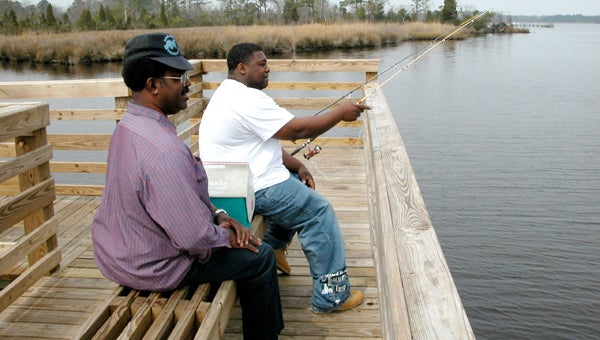N.C. outdoor sportsmen have it good
Published 12:25 pm Monday, September 7, 2015

FRED BONNER | CONTRIBUTED
FRESH CATCH: Frank Little and Santonio O’Neal spend an afternoon relaxing and fishing on a N.C. Wildlife Resources Commission fishing pier built on South Creek in Aurora. This pier was built with money anglers and hunters pay for fishing licenses and the federal excise taxes they pay on the equipment they buy.
I was recently sitting with a very experienced outdoorsman, discussing the hunting and fishing opportunities that he’d experienced in the various places that he’d visited in the United States. We talked about the licensees he’d purchased and the availability of publicly owned lands and waterways in each state and territory.
Feeling that Texas was one state that had a great reputation for hunting whitetail deer and fishing the Gulf Coast for speckled trout and redfish, I asked him if finding public access was easy there. I was surprised that he felt that Texas was not a very friendly place to hunt unless you paid big dollars to a deer-hunting outfitter or were part of a large (and expensive) hunting club. Some access to fishing areas he considered better in Texas, but still they wasn’t as good as they should be.
The state of Virginia (another hunting and fishing Mecca) didn’t rate very high on his list of being hunting and fishing friendly either. Licenses were relatively expensive in relation to the amount of hunting land that was available to hunters.
One hunter that bought a Virginia Lifetime License about 10 years ago recently pointed out that, even with the license, he was now paying an extra $120 a year for newly added privileges’ and “stamps.” He had also purchased a North Carolina license (prior to 1981) and was delighted to find that our N.C. Wildlife Resources Commission had stuck to their agreement that, “This N.C. Lifetime license would be the last hunting and fishing license that you’d ever buy in this state.”
When we began to discuss the hunting and fishing opportunities in North Carolina, he replied that he had little experience in our state and would like to try it sometime to see if our Tar Heel state measured up to his expectations. When I pulled out my old (and no longer available in booklet form) N.C. Wildlife Resources Commission’s guide and map booklet that listed all our public hunting lands and opportunities, he was astounded to see that here in North Carolina we have over two-million acres of the best hunting opportunities open for the price of a non-resident hunting or fishing license.
Sometime we Tar Heels don’t fully appreciate just what we “Joe-Six-Packs” have available to us when we purchase that relatively inexpensive hunting and fishing license. By using your computer, go to ncwildlife.org and click on N.C. wildlife management areas. This website will give you the option to download all the state’s wildlife management areas by Coastal, Piedmont and Mountain sections. You can then pick the wildlife management area that you might be interested in hunting and, eventually, apply for a permit to hunt there. There may be a nominal processing fee and you may not be lucky enough to be drawn for the hunt, but a great number of outdoorsman that do apply for these permits are drawn. You have over two-million acres of these wildlife management areas to choose from.
Anthony Licata, editor of Field and Stream Magazine, recently exposed some interesting facts about the economic importance of hunting and fishing in the United States when he stated that, “Hunters and Fishermen spend $76 billion a year directly on their pastimes, so much money that if we were a corporation, we’d be in the top twenty in the United States. When you add in the trickle-down economic impact to gas stations, motels, restaurants, etc., the number is closer to $192 billion. Through an excise tax on guns and ammunition (a law known as Pittman-Robertson) and boats, boating fuel and tackle (The Dingell-Johnson Act) sportsmen raised $882 million in 2013 alone, money that goes directly to fund wildlife and fisheries conservation.”
Hunters and fishermen are not the only ones who benefit by having these publicly owned lands. Others use them for such activities as bird watching, camping, hiking, nature study and a host of other non-consumptive activities. These
groups pay little for these lands when compared to the amount of money our hunters and fisherman pay through the DJ and PR conservation funds.
We outdoor sportsmen have long prided ourselves in (for the most part anyway) paying our own way as far as having a great deal of hunting and fishing opportunities. I know of no other country, state or province that offers more for outdoor activities.





